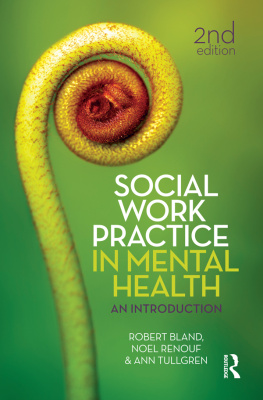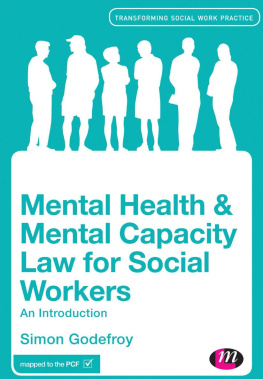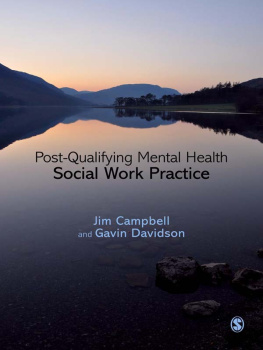SOCIAL WORK PRACTICE IN MENTAL HEALTH
AN INTRODUCTION
First published 2009 by Allen & Unwin
Published 2020 by Routledge
2 Park Square, Milton Park, Abingdon, Oxon OX14 4RN
605 Third Avenue, New York, NY 10017
Routledge is an imprint of the Taylor & Francis Group, an informa business
Copyright Robert Bland, Noel Renouf and Ann Tullgren 2015
All rights reserved. No part of this book may be reprinted or reproduced or utilised in any form or by any electronic, mechanical, or other means, now known or hereafter invented, including photocopying and recording, or in any information storage or retrieval system, without permission in writing from the publishers.
Notice:
Product or corporate names may be trademarks or registered trademarks, and are used only for identification and explanation without intent to infringe.
Cataloguing-in-Publication details are available
from the National Library of Australia
www.trove.nla.gov.au
Index by Robert Bland and Noel Renouf
Set in 10/13.5 pt Georgia by Post Pre-press Group, Australia
ISBN-13: 9781743314753 (pbk)
We have been encouraged by the very positive reaction to the publication of the first edition of Social Work Practice in Mental Health five years ago. So much of what we considered radical and innovative about the book, particularly its emphasis on the centrality of lived experience of mental illness and the importance of relationship, has been central to the success of that first edition. We have encouraged students and practitioners to take these ideas seriously and incorporate them in their work. We have offered a view of social work in mental health as embracing both scientific and relational dimensions of practice, and we continue to emphasise these dimensions of practice in this second edition.
Developments in the knowledge base for practice, and in policy, continue to reflect key themes in this edition. These include the emergence of recovery theory as a unifying conceptual basis for mental health work, the search for evidence to inform practice, and the need to work in partnership with consumers and families in all aspects of practice. Much of the most creative and exciting service development in recent years has happened in the non-government community mental health sector, where recovery principles are paramount.
We retain a focus on generic practice with people with mental health problems, rather than addressing key specialist areas of practice in depth. This edition remains an introductory text, setting out the landscape for practice and encouraging an awareness of the importance and complexity of social work in mental health. Were very mindful of the need for specialist texts in such areas as child and adolescent work and working with Indigenous peoples.
In this edition we have updated developments in the theoretical underpinnings for practice, policy and law. has been restructured to focus on social casework, rather than case management, a significant shift from managerial to professional fundamentals of practice. We also focus more on the work of the beginning practitioner, and practice at the interface between mental illness and other social problems.
Feedback from students and practitioners has indicated that they have found the first edition engaging and accessible. We have continued to try to share our own experience of practice through the many examples and personal stories scattered throughout the text. Our hope is that we present the reader with a framework not just about how to do social work in mental health, but also about how to be a mental health social worker, responding to the enormous challenges of valuing the power of healing relationships and being both fully professional and fully human.
Part I
The Context for Practice
A starting point: Understanding social work in mental health
Knowledge about mental health and the skills to work effectively with people who have mental health problems are basic to contemporary social work practice. Social workers have been employed in mental health settings for many years now, and mental health has been a traditional field of specialist social work practice. Learning about mental illness and treatment approaches, and critiquing the various medical and social models to explain mental illness and its impacts, have traditionally been core elements of the social work curriculum. Social works interest in family, community, social welfare and social justice has contributed significantly to the broad knowledge base for policy and practice in mental health. However, beyond the hospital and community mental health treatment settings are a range of recovery-based disability support services that also employ social workers. As well as working in adult mental health, social workers are employed in areas of child and adolescent mental health, forensic mental health, specialised aged-care settings, and with specific population groups such as Indigenous Australians and ethnic communities.
Understanding the challenge
Despite this long and positive connection between social work and mental health, significant challenges now confront the profession in responding to the rapidly changing work environment. In later chapters of this book, we will look at changes to the knowledge base for mental health practice, changes to mental health policy, workforce issues, and the challenges to practice arising from the emergence of the consumer and family movements in mental health. Analysis of the highly complex context for contemporary social work practice suggests a number of major challenges for social work. These include:
- the highly contested workplace in multidisciplinary teams, social workers face unrelenting competition for authority and expertise from other disciplines
- the need for a workable paradigm for practice social workers need to be able to define clearly the distinctive domain for social work practice
- connecting social work practice to a theory or knowledge base
- working collaboratively with consumers and family carers
- the education and training of social workers what knowledge skills and values do social workers need for practice, and how might they best acquire these?
Developments in policy, services, and education offer opportunities for social work to contribute to the reform process as a vital and relevant discipline. The profession needs to be able to assert with confidence that the core concerns of social workhuman rights, self-determination, family relationships and welfare, employment, housing, community, life chancesare central to mental health. We need to continue to argue for a broader agenda in mental health, beyond narrow clinical concepts of illness and treatment. At the same time, we need to demonstrate the range of core knowledge and skills that underpin generic mental health competencies. In the current context of valorising the evidence base for practice and the specificity of interventions, we are challenged to be clear about what we do, and to be able to demonstrate the effectiveness of our actions. The survival of the profession into the future may well depend on our capacity to meet this challenge.
In this book, we take up the challenge to find some directions for the profession. We believe that these directions will be relevant internationally, but we begin by setting out the Australian situation, as this is the specific context from which we are writing.
Social work in the Australian mental health workforce








